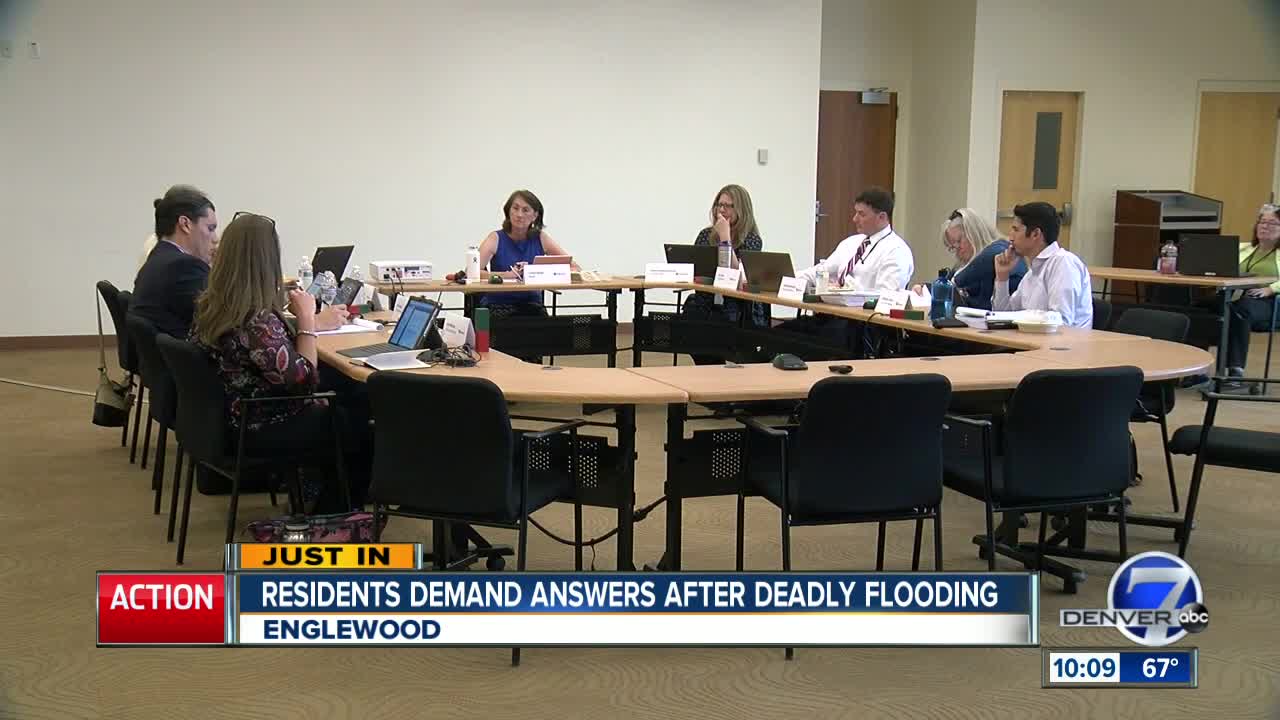ENGLEWOOD, Colo. — Almost one month since the tragic flooding in Englewood took a young woman’s life, city council members finally discussed what went wrong during their routine public meeting Monday evening.
The July 24 storm killed Rachael Marie Haber, 32, who was found in a flooded basement apartment on the 4600 block of S. Acoma Street in Englewood.
Residents are demanding the mayor, and several city council members resign for several reasons including allegations of illegally appropriating funds and failure to fix or upgrade the storm drainage system for decades.
Englewood property owner Vicki Hoffman is one of many demanding Englewood city council take responsibility for the damage to homes. She addressed Mayor Linda Olson during the public comment portion of Monday’s meeting.
“I am here to request from the city council that you immediately be removed as a mayor and resign as a council member. You’ve done nothing to help the citizens of the city, and I am disturbed and appalled at your ineffectiveness in the leadership position,” said Hoffman.
The amount of rain the fell during last month's 500-year storm flooded and destroyed homes, but it took two days before the city addressed the public.
Monday, during a study session meeting prior to the regularly scheduled council meeting, council members admitted their shortcomings in emergency management in front of the public.
“I didn’t realize how big it was until a day and a half later,” said Olson. “I think the quickness of understanding the depth of what was going on is what I feel most badly about.”
City Manager Eric Keck told Denver7, funds were not allocated for storm drain upgrades in the recently approved budget because a study is required to address needs.
“The fund balance for the stormwater utility will be utilized to study the south-central Englewood area, and from there the consultant study’s recommendations will provide us with an estimate of necessary funding. Any improvements made would need to come from the stormwater utility fund,” said Keck.
He also mentioned that the city had been aware of the vulnerability for flooding in north Englewood in Dry Gulch that connects to Denver’s Harvard Gulch; however, no project had been identified for the south-central portion of Englewood as it had not been identified as a flood hazard area. This could be the reason most homeowners were told they didn’t need flood insurance.
Hoffman told Denver7 city council has been using studies as an excuse to avoid fixing the problem for decades.
“I pulled up a study from 1999 that’s on Englewood’s website that clearly showed a floodplain,” said Hoffman.
In all, the city council agreed there was no plan in place to act in an emergency like severe flooding. When searched, Denver7 identified a portion of the website addressing emergency management protocol. Olson mentioned Monday night, she was unaware of it and has learned from the mistakes made during the tragic event.
“I do see that people look to whoever is in charge to be the point person for communication. I kept pushing things towards the city manager,” said Olson.
Keck told Denver7, they are still determining the dollar amount of damage in the city, but it was not enough to qualify for the Federal Stafford Act Assistance. There were over 70 businesses and residential properties impacted by the storm.
In response to residents’ claims the drains were not cleaned before the expected rain, he said:
“Both Public Works and Utility staff clean the inlets and drain systems annually if not more frequently depending upon the nature of the storms and damage caused to the gravel alleys where some storm infrastructure exists,” said Keck.


